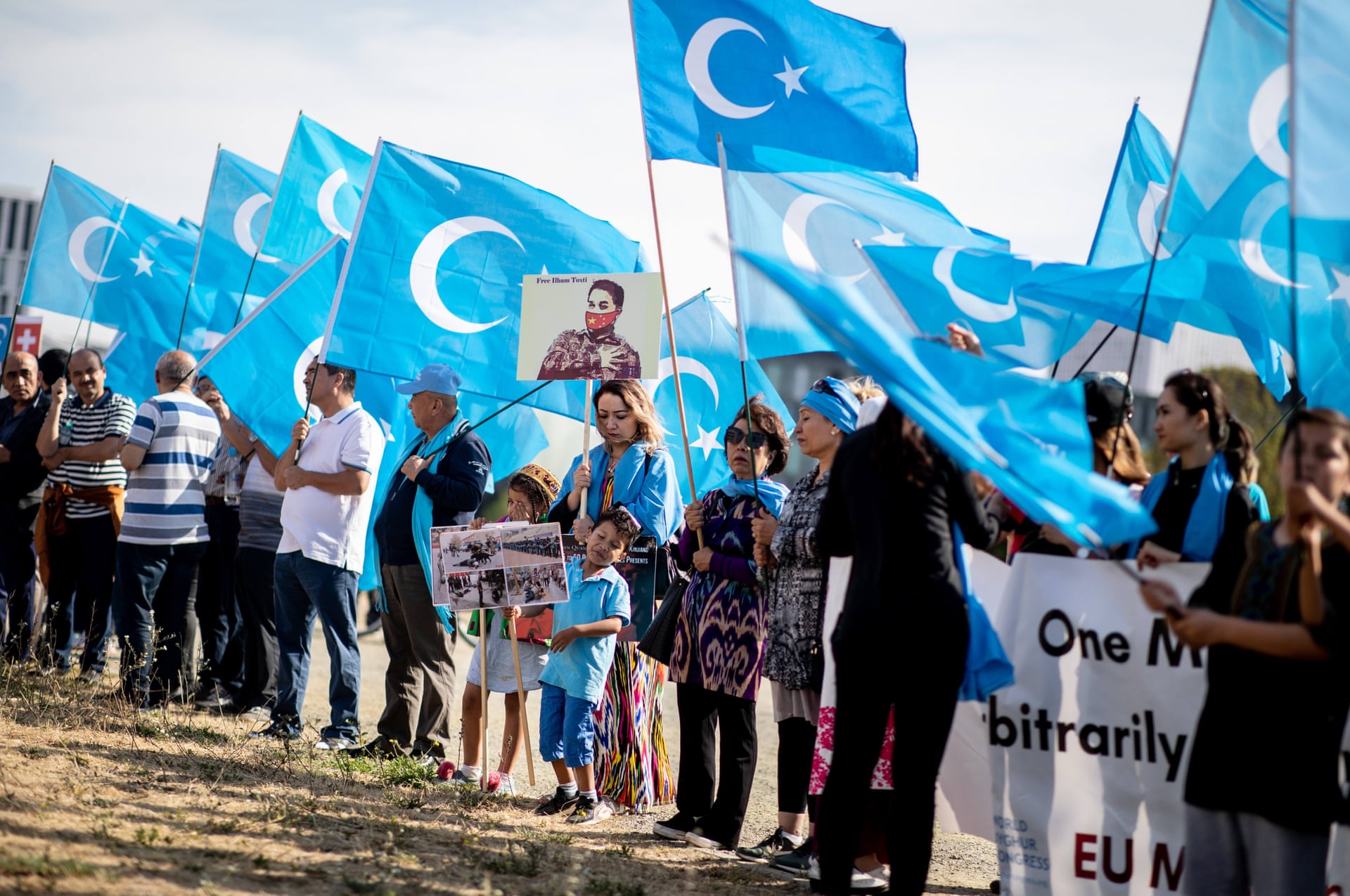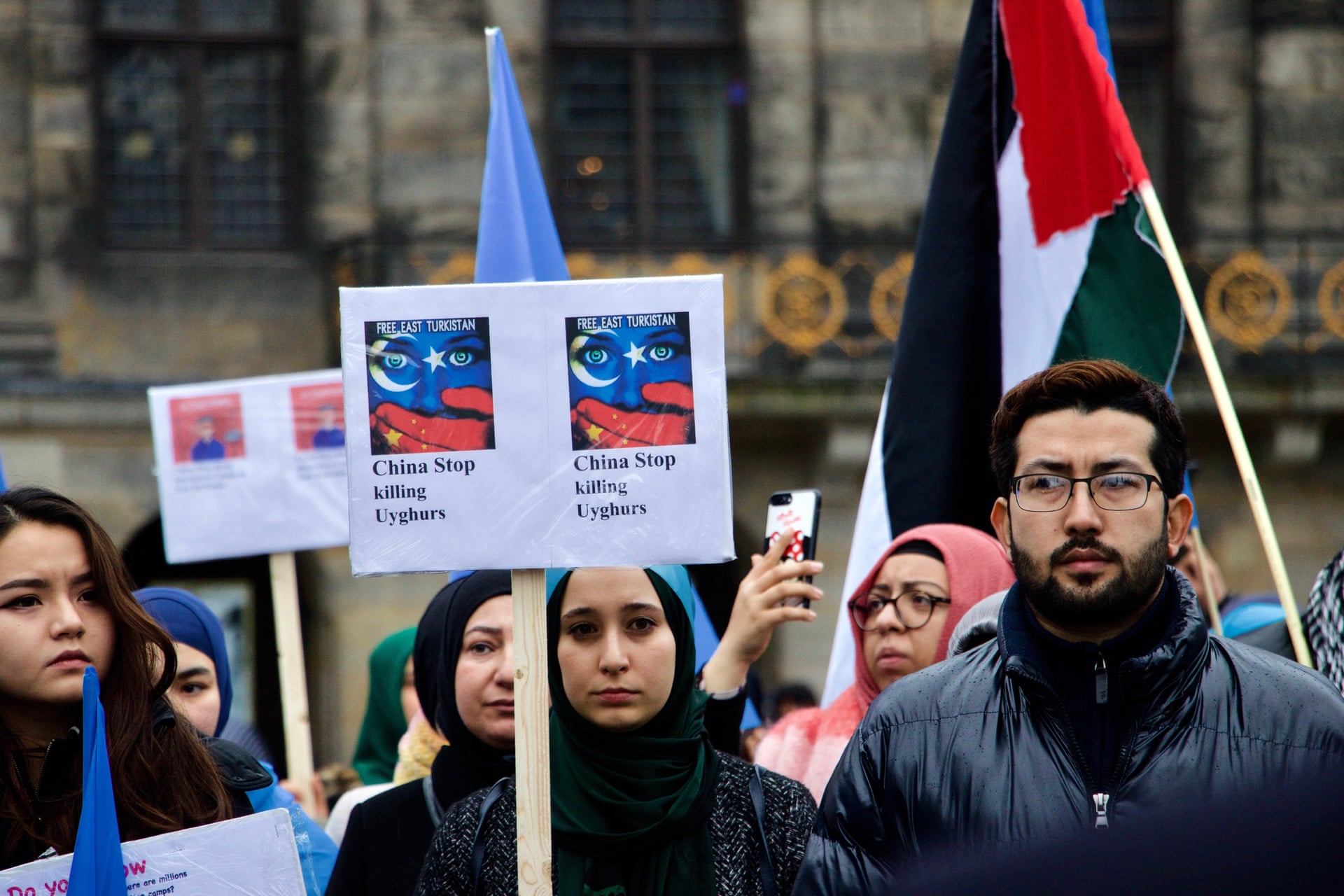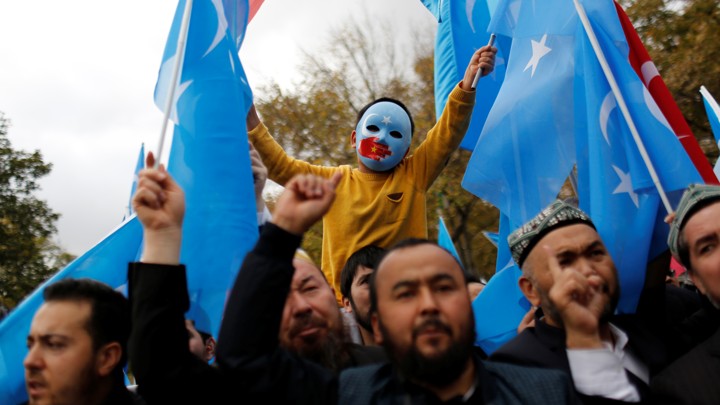Uighurs living in Germany, the Netherlands, Finland, Sweden, and France have complained of intimidation by Beijing
By Benjamin Haas in Munich
Demonstrators holding Uighur flags in Berlin before a meeting between German chancellor Angela Merkel and Li Keqiang.
Two days after Abdujelil Emet sat in the public gallery of Germany’s parliament during a hearing on human rights, he received a phone call from his sister for the first time in three years.
But the call from East Turkestan, in western China, was anything but a joyous family chat.
It was made at the direction of Chinese security officers, part of a campaign by Beijing to silence criticism of policies that have seen more than a million Uighurs and other Muslim minorities detained in concentration camps.
Emet’s sister began by praising the Communist party and making claims of a much improved life under its guidance before delivering a shock: his brother had died a year earlier.
Emet’s sister began by praising the Communist party and making claims of a much improved life under its guidance before delivering a shock: his brother had died a year earlier.
But Emet, 54, was suspicious from the start; he had never given his family his phone number.
Amid the heartbreaking news and sloganeering, he could hear a flurry of whispers in the background, and he demanded to speak to the unknown voice.
Moments later the phone was handed to a Chinese official who refused to identify himself.
By the end of the conversation, the façade constructed by the Chinese security agent was broken and Emet’s sister wept as she begged him to stop his activism.
By the end of the conversation, the façade constructed by the Chinese security agent was broken and Emet’s sister wept as she begged him to stop his activism.
Then the Chinese official took the phone again with a final warning.
“You’re living overseas, but you need to think of your family while you’re running around doing your activism work in Germany,” he said.
“You’re living overseas, but you need to think of your family while you’re running around doing your activism work in Germany,” he said.
“You need to think of their safety.”
In interviews with more than two dozen Uighurs living across Europe and the United States, tales of threats across the world are the rule, not the exception.
In interviews with more than two dozen Uighurs living across Europe and the United States, tales of threats across the world are the rule, not the exception.
Uighurs living in Germany, the Netherlands, Finland, Sweden, and France all complained of similar threats against family members back in East Turkestan, and some were asked to spy for China.
More than a million Uighurs, a Muslim Turkic ethnic group, and other minorities are being held in concentration camps, according to the UN, with some estimates saying the number is “closer to 3 million”.
Emet, originally from Aksu in East Turkestan, has lived in Germany for over two decades and is a naturalised citizen.
More than a million Uighurs, a Muslim Turkic ethnic group, and other minorities are being held in concentration camps, according to the UN, with some estimates saying the number is “closer to 3 million”.
Emet, originally from Aksu in East Turkestan, has lived in Germany for over two decades and is a naturalised citizen.
He does volunteer work for the World Uyghur Congress and is a part-time imam in his community. He has never told his family about his activism, hoping the omission would protect them.
“I will not keep my silence and the Chinese government should not use my family to threaten me,” Emet said.
“I will not keep my silence and the Chinese government should not use my family to threaten me,” Emet said.
“I was clear with them on the phone: if they harm my family, I will speak out louder and become a bigger problem for the government.”
‘China threatening people in Germany should never become normalised’
Most Uighurs remain silent, and have found little help from European authorities.
But Margarete Bause, a member of the German parliament representing Munich, said Chinese interference was unacceptable and urged Uighurs to contact their MPs.
“We need to protect visitors to the Bundestag. Observing parliament is a fundamental right in any democracy,” she said.
“We need to protect visitors to the Bundestag. Observing parliament is a fundamental right in any democracy,” she said.
“It’s also important for the German public to know how China is trying to exert influence here. The Chinese government threatening people in Germany should never become normalised.”
Bause has been interested in Uighur issues for over a decade, after she was admonished by Chinese diplomats in 2006 for attending an event hosted by the World Uyghur Congress.
Bause has been interested in Uighur issues for over a decade, after she was admonished by Chinese diplomats in 2006 for attending an event hosted by the World Uyghur Congress.
In August she was denied a visa as part of a parliamentary visit to China and the trip was eventually cancelled in response.
Beyond discouraging activism, Chinese officials have also tried to recruit Uighurs living abroad to spy on others in their community, asking for photos of private gatherings, names, phone numbers, addresses and licence plate numbers.
Beyond discouraging activism, Chinese officials have also tried to recruit Uighurs living abroad to spy on others in their community, asking for photos of private gatherings, names, phone numbers, addresses and licence plate numbers.
Some are recruited when they go to Chinese diplomatic missions in Europe to request documents, and others are contacted by security agents over WeChat, a popular Chinese messaging app.
Emet’s number is likely to have been leaked to Chinese security agents this way, he said, with his number well known in the Uighur community in Munich.
Chinese agents offer cash, the promise of visas to visit East Turkestan or better treatment for family members as a reward, but also dangle the threat of harsh consequences for those same family members if their offers are refused.
Chinese agents offer cash, the promise of visas to visit East Turkestan or better treatment for family members as a reward, but also dangle the threat of harsh consequences for those same family members if their offers are refused.
Uighurs described having crucial documents withheld from Chinese embassies and consulates unless they agreed.
One Uighur living in Germany who asked to remain anonymous for fear of retaliation said a Chinese agent asked for photos of Eid and other celebrations, and specifically asked for information on Uighurs who had recently arrived in Europe.
One Uighur living in Germany who asked to remain anonymous for fear of retaliation said a Chinese agent asked for photos of Eid and other celebrations, and specifically asked for information on Uighurs who had recently arrived in Europe.
A group of people stage a protest against China’s human rights violations against members of the Turkic Uighur minority.
The recent surge in activism among Uighurs overseas is mostly a direct response to the increasingly repressive policies in East Turkestan, and as more people speak out China has doubled efforts to silence them and control the narrative over what it calls “re-education camps”.
There are some signs China’s campaign to silence Uighurs in Europe is working.
Gulhumar Haitiwaji became an outspoken critic of policies after her mother disappeared into one of the camps in East Turkestan, appearing on French television and starting a petition addressed to French president Emmanuel Macron that garnered nearly half a million signatures.
But after threats from Chinese officials targeting her mother, Haitiwaji cancelled a planned appearance in March at a human rights summit in Geneva, according to two sources familiar with her plans.
Haitiwaji and the organisers of the meeting did not respond to multiple requests for comment.
Adrian Zenz, an independent researcher who focuses on East Turkestan, said European governments needed to do more to protect their citizens from Chinese intimidation.
“The biggest mistake European Union countries make is that once they allow China to get away with something, that emboldens Beijing,” he said.
Adrian Zenz, an independent researcher who focuses on East Turkestan, said European governments needed to do more to protect their citizens from Chinese intimidation.
“The biggest mistake European Union countries make is that once they allow China to get away with something, that emboldens Beijing,” he said.
“China has systematic strategies in place and the threats to Uighurs in exile show that. Europe needs its own unified strategy to stand up to China and respond to these threats.”
The Chinese embassy in Berlin did not respond to requests for comment.
The Chinese embassy in Berlin did not respond to requests for comment.



 Uighur demonstrators in Turkey wave East Turkestan flags in a protest against China.
Uighur demonstrators in Turkey wave East Turkestan flags in a protest against China.




